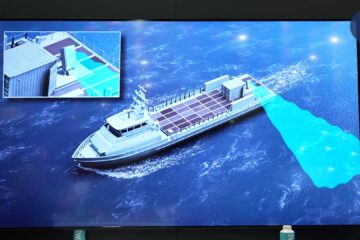U.S. Navy press release
The two leaders shared observations about the conflict in Ukraine and discussed plans to advance high-end interoperability between the U.S. and French navies.
The two leaders reaffirmed their commitment to advance high-end interoperability between the U.S. and French navies. Russia’s unprovoked invasion of Ukraine underscores the importance of enhanced cooperation between like-minded allies intent on preserving a rules-based global order.
Lucas cited the contributions of USS Ross (DDG 71), which deployed alongside the Charles de Gaulle Strike Group (TF 473), as part of a cooperative deployment from February to April 2022. Sophisticated, combined task groups such as these demonstrate the existing high-level of interoperability between U.S and French surface combatants.

Merz commended the leadership of the Charles de Gaulle strike group during tri-carrier operations with the Harry S. Truman Carrier Strike Group and the Italian Carrier Cavour in the Mediterranean Sea demonstrating solidarity amongst NATO allies.
France is America’s oldest ally – dating back to 1781 when France supported the U.S. during the Revolutionary War. In the years since, the strong bond between the two allies has matured, testing joint, combined combat skills during both World Wars and continuing a long-standing tradition of exceptional military partnership in the years since.

In December 2021, French and U.S. officials signed a Strategic Interoperability Framework between the two navies aimed at enhancing navy-to-navy operational compatibility. Over the past few months, French and U.S. naval staffs have developed long-term bilateral roadmaps focusing on achieving combined sea control, combined power projection, and assured Command, Control, Communications, Computers and Intelligence (C4I) and data sharing.
The leaders will convene again next year for a Strategic Dialogue in Washington, D.C. For more information on the Strategic Interoperability Framework






